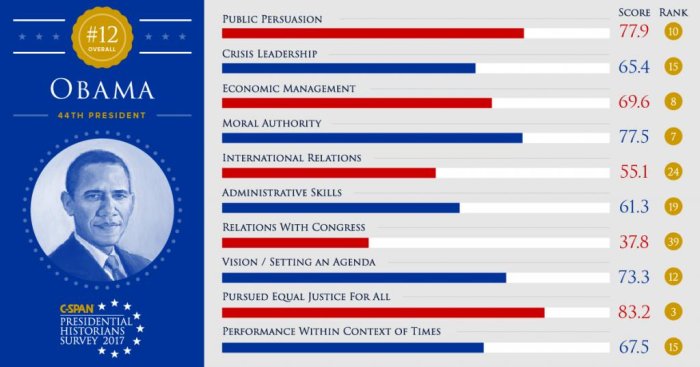
Feb. 17 (UPI) — A survey of nearly 100 historians and presidential scholars from across the United States has rated Barack Obama as one of the top 12 greatest presidents in American history.
The 2017 Survey of Presidential Leadership, which rates American leaders on a variety of criteria, was released Friday by political broadcaster C-SPAN.
All 44 U.S. presidents were given a score on 10 different aspects of the job — public persuasion, crisis leadership, economic management, moral authority, international relations, administrative skills, relations with Congress, agenda, equality and contemporary performance.
Overall, Obama received a score of 669 — which ranked him behind just 11 other American leaders.
“Although 12th is a respectable overall ranking, one would have thought that former President Obama’s favorable rating when he left office would have translated into a higher ranking in this presidential survey,” Howard University historian Edna Greene Medford said in a statement. “But, of course, historians prefer to view the past from a distance, and only time will reveal his legacy.”
Friday’s was C-SPAN’s third presidential ratings survey, after reports conducted in 2000 and 2009 — and the first appearance of Obama in the rankings.
The two-term president ranked highest in equality (No. 3), owing to his yearslong crusade to support civil and LGBT rights. The U.S. Supreme Court legalized same-sex marriage while Obama was in office. He rated lowest in congressional relations (No. 39) — partly because Republicans controlled both chambers for the final two years of his administration.
Obama ranked in the top 15 in seven of the 10 categories — contemporary performance (15), crisis leadership (15) and agenda (12) — and the top 10 in four — public persuasion (10), economic management (8), moral authority (7) and equality. He rated 24th in international relations and 19th in administrative skills.

Historians, biographers, and other professional observers of the presidency were surveyed for the report, which also solicited opinions of several academic advisers. Individual survey results are kept secret. All 10 categories were given equal weight.
Abraham Lincoln (1861-65) retained the top spot and has been at No. 1 for all three surveys. George Washington (1789-97) was ranked second and Franklin D. Roosevelt (1933-45) third. Theodore Roosevelt (1901-09) and Dwight Eisenhower (1953-61) round out the top five — followed by Harry Truman (1945-53), Thomas Jefferson (1801-09), John Kennedy (1961-63), Ronald Reagan (1981-1989) and Lyndon Johnson (1963-69).
“Once again the Big Three are Lincoln, Washington and FDR – as it should be,” Rice University historian Douglas Brinkley said. “That Obama came in at number 12 his first time out is quite impressive.”
The five lowest-rated presidents are James Buchanan (1857-61), with a score of 245, Andrew Johnson (1865-69), Franklin Pierce (1853-57), Warren Harding (1921-23) and John Tyler (1841-45).
“The golden age of the American presidency, according to this survey, is 1933-1969,” historian and biographer Richard Norton Smith said. “Five presidents from this era each rank in the top ten which tells you something about the criteria that historians tend to use. It reinforces Franklin Roosevelt‘s claim to be not only the first modern president but the man who, in reinventing the office, also established the criteria by which we judge our leaders.”
The biggest mover in the 2017 survey is Andrew Jackson (1829-37), who dropped five spots to No. 18. Eisenhower made the biggest leap forward, going from No. 8 in 2009 to No. 5 this year.
George W. Bush ranked 33rd, up three spots, Bill Clinton was 15th and George H.W. Bush rated 20th. Donald Trump will be evaluated in a future survey after he leaves office.





